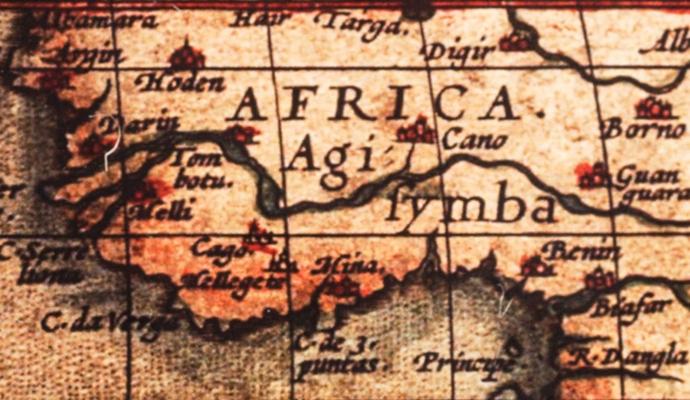Chocolate lovers around the world are noticing a steep rise in prices. From climate change impacting cocoa production to economic fluctuations, several factors are making your favourite treat more costly. In light of these rising costs, if you’re considering indulging, make sure it’s worthwhile—opt for high-quality chocolate that delivers on both taste and ethical sourcing. Here’s why chocolate prices are climbing and how to ensure your indulgence is worth every penny. Learn about what makes Michel Cluizel stand apart on this informative page we have on their sourcing & tempering information here:
The Largest Exporters Of Cocoa Beans In Trouble
Ghana & Ivory Coast
On the West African coast lies the producers of cocoa beans responsible for 60% of the world's supply: Ghana & Ivory Coast. They are currently combatting significant hardships growing cocoa beans, leading to the price increase we've already begun to see here in the west. Illegal gold mining causing environmental damage, the spread of the devastating swollen shoot virus and unusual climate patterns have all contributed to a confluence of factors making life difficult for cocoa bean farmers.

Swollen Shoot Virus
The swollen shoot virus (CSSV) is having a profound impact on cocoa production in Ghana and the Ivory Coast, with COCOBOD - the Ghana government controlled cocoa board, price fixing cocoa in Ghana to protect farmers from cocoa price volatility - estimating that 590,000 hectares (1.46 million acres) of plantations have been infected. This virus attacks the internal systems of cocoa trees, leading to symptoms like shoot swelling, leaf discolouration, and eventual death of the plant. In areas like Ghana’s western cocoa heartland of Samreboi, a significant reduction in cocoa hectares—from 38,000 to just 15,400—highlights the devastating reach of the disease.
As a result, the region is facing its lowest crop yields in 20 years, indicating a severe production decline. The CSSV’s impact is exacerbated by the fact that even once infected trees are dug out root and all - which is the necessary response - and replanted, the new cocoa trees require two to four years to mature and produce beans again, creating a substantial lag in cocoa bean availability. This lag, coupled with the disease’s rapid spread, poses a serious challenge to the long-standing cocoa dominance of West Africa and threatens to propel a shift in global cocoa production to other regions.

Illegal Gold Mining
Illegal gold mining has devastated cocoa production in regions like Ghana. Interviewed by Reuters, a local farmer named Janet Gyamfi witnessed her 27-hectare cocoa farm reduced to barren land, with less than a dozen trees remaining from the nearly 6,000 she had cultivated. These mining operations not only disrupt cocoa cultivation but also leave the environment scarred with cyanide-laced waste pools. The practice has expanded rapidly, with an estimated 20,000 hectares of cocoa land lost to such activities as of four years ago, a figure that experts believe has grown considerably.
Climate Change
Climate change is compounding the challenges in Ghana and the Ivory Coast’s cocoa sectors. Erratic rainfall patterns and increased temperatures are straining the growth of cocoa plants, which thrive in stable conditions. These changes can exacerbate the spread of diseases like the swollen shoot virus and affect the development of the cocoa pods themselves, further threatening crop yields. Researchers anticipate that such climatic shifts could lead to a significant reduction in suitable growing areas by 2050, another factor leading to the long-term downwards trend of cocoa production.
The Economics - A Quick Overview
Cocoa prices have surged, doubling this year, indicating costlier chocolate ahead.
U.S. chocolate prices are already up over 10%, signalling higher consumer costs coming.
The crisis could turn everyday chocolate into a luxury due to rising costs.
Chocolate makers' advance purchases may delay, but not prevent, the expected price increases hitting consumers.
A Bleak Prospect For The Future Of Chocolate
Ghana's Cocobod has utilized a portion of a $200 million World Bank loan for the rehabilitation of cocoa plantations ravaged by the cocoa swollen shoot virus. The virus has been detrimental, leading to a significant drop in cocoa production—from a peak of 1.048 million metric tons in the 2020/21 season to just 600,000 metric tons. The rehabilitation project, expected to revitalize these lands, will take a minimum of five years before economic production can resume. Despite the substantial loan, efforts are constrained by Ghana's economic challenges and limited funds of the Cocobod. The initial phase involves Cocobod managing the affected farms, replacing diseased trees, and nurturing them until they are ready to be returned to farmers. This project follows a previous effort funded by a $600 million AfDB loan, which covered more than 88,000 hectares, with 40,000 hectares soon to be restored to farmers. This current rehabilitation initiative signifies a critical step towards recovery, but the recovery is being severely outpaced by the spread of the disease, which has already claimed over 590,000 hectares of cocoa trees.






